Reviews and recommendations are unbiased and products are independently selected. Postmedia may earn an affiliate commission from purchases made through links on this page.
Anthony Gismondi: It’s still possible to enjoy European wines at a reasonable price

Anthony Gismondi offers up his European wine tour at home for less than $25 a bottle per day.

Article content
After decades of education and globalization, the wine world is still lazily carved into two parts, the Old World and the New World. Europe is considered the home of Old World wines, while North and South America, Australia, New Zealand and South Africa tend to fall under the New World moniker.
Advertisement 2
Article content
It’s not so much aged-based but more about the philosophy of winemaking and the style of the wine.
Article content
It doesn’t matter that Chile has been growing grapes since the mid-1550s but that their wines are predominately varietal — named after a single grape variety — and that the country’s prominence as an essential world exporter is less than 30 years old. It’s the same story for most other New World producers. Habits die hard.
We know that consumers and retailers in the New World have to work a bit harder to understand the Old World wines of Europe, but once comprehended, the rewards are many. The single most significant difference is the structure and style of European wine. Usually, higher acids and a leaner structure make it eminently more drinkable with food, as does its lower alcohol. Although it’s fair to say warmer weather in most Old World wine regions is changing the taste and structure of their wines faster than they might like.
Advertisement 3
Article content
Writing about touring Europe on $25 a day was fashionable a generation ago. It’s almost unthinkable today, but I thought we could try to tour Europe for less than $25 a bottle this week and see what’s possible without leaving the continent.
So, where does one begin to explore European wine for $25 a day? White wines can be particularly rewarding given their tendency to be food-friendly, and the mix of seafood and Asian dishes in British Columbia tends to match up well against them.
Champagne is perhaps the best food wine, but finding one under $25 is impossible. That takes us to other wines and countries like Riesling (German or Austrian), Albariño or Verdejo (Spain), Viognier, Picpoul, Rolle, Grenache Blanc (France), Grüner Veltliner (Austria), Vermentino, Arneis, Verdicchio, Inzoli and Garganega (Italy), Vinho Verde, Encruzado, Bical, Cerceal and Arinto from Portugal and don’t forget the Assyrtiko and Moschfilero from Greece.
Advertisement 4
Article content
The red wine search will be easier and likely plentiful, especially if you move outside the most famous and expensive production regions of Burgundy, Bordeaux, Tuscany, Ribera del Duero, Rioja, and Porto, the home of fortified ports. Here’s a short list of wines with a sense of place with a story to tell something becoming increasingly rare under $25 anywhere in the world.
It’s our European wine tour at home for less than $25 a bottle per day.
WHITE
• Adegas 2021 Valmiñor Darila, O Rosal, Rías Baixas, Galicia, Spain ($23.99).
• Argiolas 2021 Costamolino Vermentino di Sardegna, Sardinia ($21.99).
• Fontanafredda Briccotondo 2020 Langhe Arneis, Piedmont, Italy ($19.99).
• Laurenz V. Und Sophie 2019 Singing Grüner Veltliner, Niederösterreich, Österreich, Austria ($23.99).
Advertisement 5
Article content
• Miral Grillo 2020, Sicily, Italy ($17.99).
• Nicosia Grillo 2020, Sicily, Italy ($19.99).
• Sartarelli 2020 Verdicchio dei Castelli di Jesi Classico, Marche, Italy ($21.99).
• Selbach 2019 Riesling Fish Label, Mosel, Germany ($20.99).
RED
• Borsao 2020 Garnacha Seleccion, Campo de Borja, Spain ($15.99).
• El Petit Bonhomme 2020 Tinto, Jumilla, Spain ($17.99).
• Cusumano Nero d’Avola 2020, Sicily, Italy ($18.99).
• M. Chapoutier 2019 Belleruche Côtes du Rhône Rouge, Rhone Valley, France ($18.99).
• Masroig Sola Fred 2018 Montsant, Catalunya, Spain ($19.99).
• Pasqua ‘Romeo & Juliet’ Passione e Sentimento, Veneto, Italy ($14).
• Pedra Cancela 2016 Selecção do Enólogo, Dão, Portugal ($17.99).
• Château Pesquié 2020 Ventoux Terrasses Rouge, Rhone Valley, France ($20.99).
Advertisement 6
Article content
Weekend wine picks
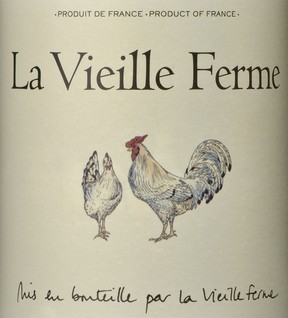
La Vieille Ferme Luberon Blanc 2020, Côtes du Lubéron, Provence, France
$12.99 I 87/100
UPC: 631470000049
The Perrin family does a great job with this simple but well-made white Luberon that mixes Grenache Blanc with Bouboulenc, Ugni Blanc and Roussanne. The nose is a mix of fresh pastry, yellow pear, quince, and lemon oil that spills onto a dry palate with juicy, citrus fruit flavours and creamy textures — a perfect wine for chicken dishes, soft cheeses or shellfish. Terrific value.
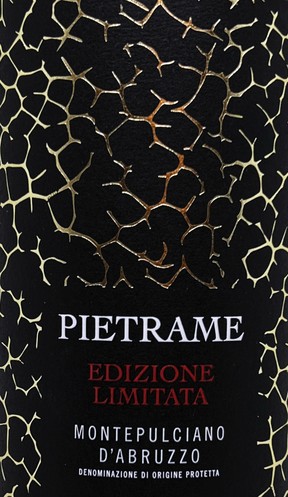
Pietrame Edizione Limitada Montepulciano d’Abruzzo 2019, Abruzzo, Italy
$12.99 I 87/100
UPC: 8002001083350
This Montepulciano offers classic rich, round, dark cassis and black raspberry. The palate has low tannins and supple textures flecked with dried herbs, chocolate, and licorice. Easy sipping and ready for fall barbecues featuring chicken or pork or a favourite pasta dish. Ready to drink. Fair value.
Advertisement 7
Article content

Faustino Rioja Organic 2020, Rioja, Spain
$19.99 I 87/100
UPC: 8410441112002
A new wine from an old Rioja wine producer that, surprisingly, is certified organic. The colour is dark, the yields are low, and the Tempranillo is a mix of berries black and red. The attack is round but fresh, and the tannins youthful but light — a perfect mid-week chicken wine that would also suit soft cheese.
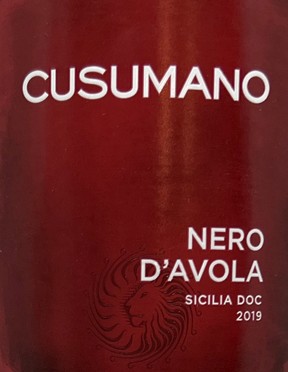
Cusumano Nero d’Avola 2020, Sicily, Italy
$18.99 I 88/100
UPC: 8028262000141
The Cusumano Nero d’Avola has been around for a while, but attention to detail leads to its intriguing modern style. The family owns and operates over 400 hectares of vineyards across Sicily, and this red is estate grown. The fermentation is in stainless steel, and the fruit sees no oak over five months of aging on its lees. Instead, look for a peppery, black raspberry affair with a savoury undercarriage that finishes lean and dry with a touch of cardamom and licorice. A pasta red for sure, but grilled ribs would be a good match too. Again the price is a bonus.
Advertisement 8
Article content
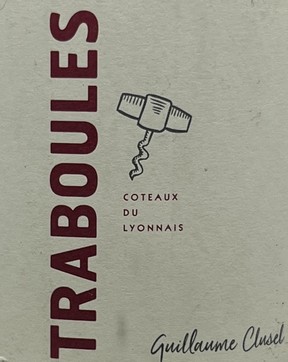
Guillame Clusel Trabouls 2018, Rhone Valley, France
$35.99 I 89/100
UPC: 3760194400228
Back in the 1950s, René and Joséphine Clusel began cultivating vegetables, fruit trees, and Côte-Rôtie vines. Like many other farmers in the Ampuis region, they sold their wine in bottles, and at a time when Côte-Rôtie wines were mostly unknown, René Clusel’s Côte-Rôtie was popular with connoisseurs. The estate is run by Guillaume Clusel, Gilbert Cluse, and Brigitte Roch. Traboules has nothing to do with Syrah, but winemaker Guillaume Clusel has taken advantage of the decomposed granitic soils that lie south of Lyon to give us a juicy red-fruited wine. A delicious drop of Gamay that walks the line between silky textures and bright acidity. Ready to drink, it is a perfect match for chicken or veal.
Advertisement 9
Article content
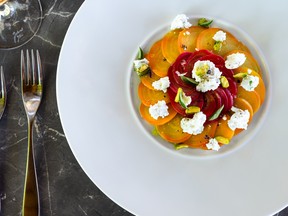
Wine match: Mixed beets with basil pistachio pesto and feta
Bring beets to life with this fresh and flavourful recipe from Mission Hill Family Estate Executive Chef, Patrick Gayler of Terrace Restaurant. Gayler’s colourful creation sees fresh beets tossed in a homemade pesto topped with creamy goat feta. Yum!
Mixed beets with basil pistachio pesto and feta
6 pc assorted beets, cleaned (ideally about golf ball size)
2 quarts (8 cups) water
3 oz (85 mL) cider vinegar
3 oz (85 mL) sugar
1 tbsp (15 mL) kosher salt
6 oz (170 g) fresh goat feta
Combine all the ingredients (except the feta) in a medium-size pot and bring to a light simmer. Stir, then cover and allow to simmer for about 15 minutes. After 15 minutes, pierce a beet with a toothpick, if the pick enters easily and then releases from the beet, the beets are done. If any resistance is met, or the beet does not fall off the toothpick, continue cooking for a few more minutes. Once done, turn off the heat and let the beets cool to room temperature.
Advertisement 10
Article content
While the beets are cooling, prepare the pesto. Once cooled, drain off the beets and peel them using a piece of paper towel. If the beets are properly cooked the skins should fall off quite easily when rubbed with a paper towel or cloth. Slice the beets into desired shape, then transfer to a serving dish, season with salt and pepper, then top with pesto and feta.
Pistachio basil pesto
1/4 cup s (60 mL) shelled pistachios
2 cups (500 mL) basil, packed
1 clove garlic
1 cup (250 mL) extra virgin olive oil
Salt and pepper to taste
Chop the basil, garlic and pistachios, then transfer to a mortar and pestle. And a pinch of salt and pepper then begin to work the mix to break it down. Add about half the oil and continue to work the mixture until it becomes paste-like. Add the remainder of the oil and then give a taste for seasoning. Reserve in the fridge until ready to use.
Advertisement 11
Article content
Serves 4-6.
Recipe match
Mixed beets with basil pistachio pesto and feta rich and earthy, a fresh white wine should be just the ticket to lift this off the palate; beer lovers should reach for a citrus IPA.
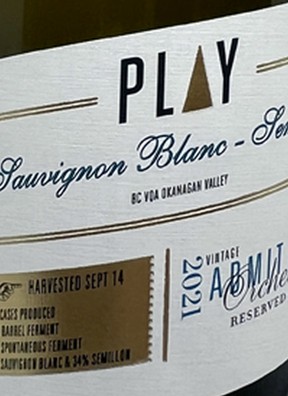
Play Estate Ad Lib Sauvignon Blanc — Sémillon 2021, Okanagan Valley, British Columbia $20
Look for grapefruit pith, a hit of pear, and a strong lemon citrus undercurrent to light up this earthy, cheesy dish.

Fort Berens Pinot Gris 2021, British Columbia, Canada $21.99
A citrus, mineral, melon palate before ends dry, streaked with bitter grapefruit that should make for a good match with beets, pesto and feta.
Source: vancouversun.com


